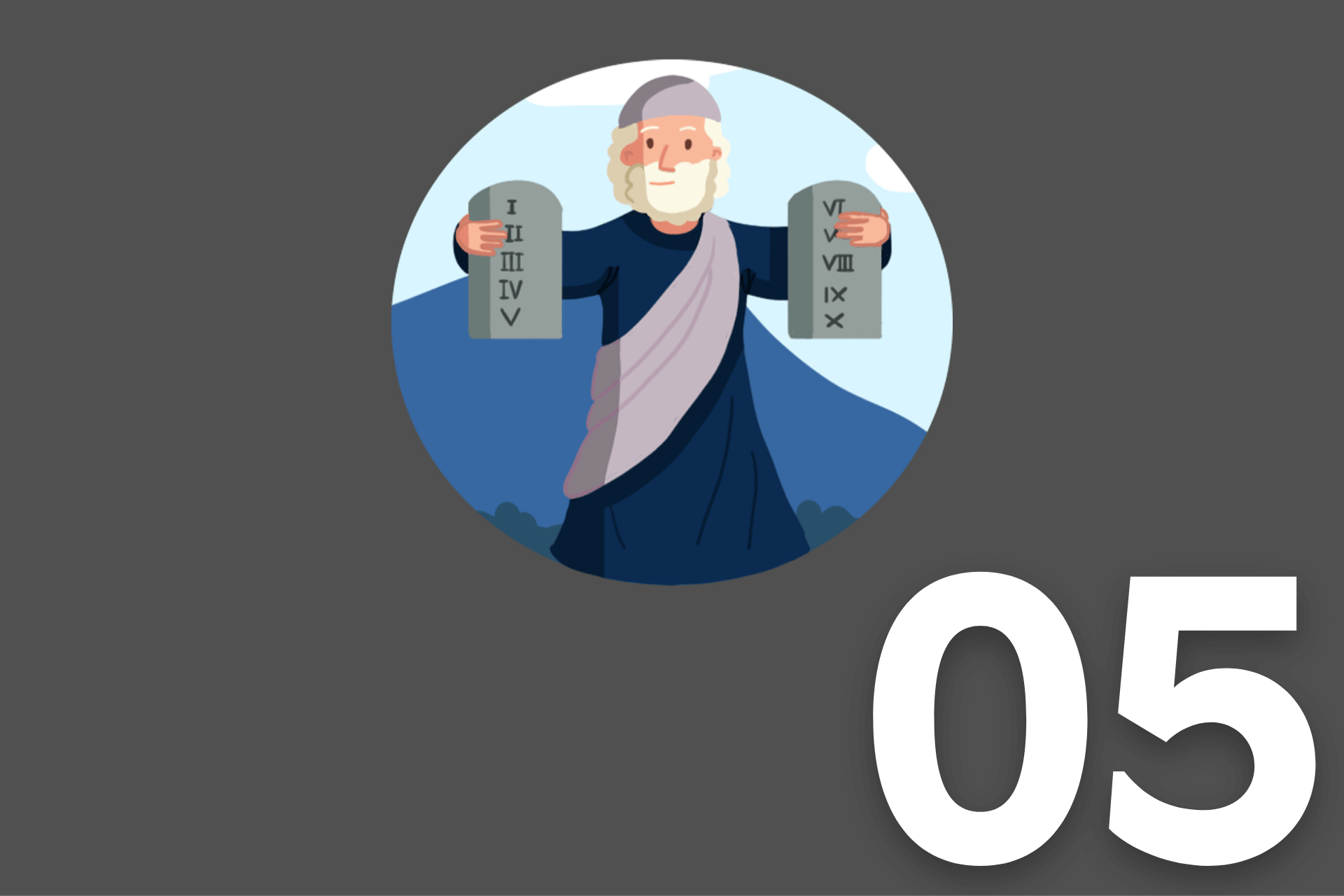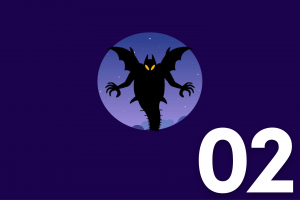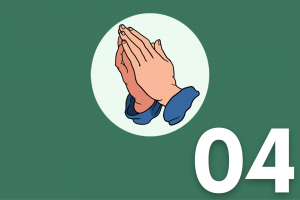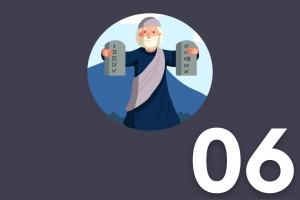Shabbat Shalom everyone! My name is Peter. Today is the 13th day of the 1st month, year 5783; April 16th, 2022, and welcome to the Our Heavenly Father podcast.
In today’s episode, we’ll be talking about The Ten Commandments; better understanding them, their relevance and their importance.
In prior episodes, we talked about how having free will reveals a loving Heavenly Father and how He Himself gave instructions for all of humankind, and how those instructions have been preserved for us over the past three thousand years. How an all-powerful and all-knowing Heavenly Father gave us truly eternal Instructions that we can only obey within a covenant relationship with our Creator. A relationship with obligations and responsibilities on both sides; a covenant that requires our active participation to bring balance, harmony and peace into the world.
In this episode, we will talk about The Ten Commandments that God has kept for us through the Israelite people. A renewed covenant with humanity. Commandments restored to us by God Himself at Mount Sinai.
Before getting into the commandments, we should talk briefly about the Hebrew language again. We had spoken earlier about it being very different from our English language, which has a more philosophical basis. Hebrew is a language of concrete ideas; a language of action and not thought. The original divine language into which God spoke the entire universe into existence.
Samson Raphael Hirsch tells us about the Hebrew language,
“that there must be an internal integrity and wholeness to the language of Torah. A Divine language cannot be haphazard or inconsistent; but, almost by definition, must be systematic, orderly and logical.”
God’s language would indeed be perfect and if we have numerous definitions for a single word, we must have missed the root of the meaning somewhere along the way.
Reading from Exodus 20, verse 1:
“And God spoke all these words, saying:”
The commandments were spoken directly to the Israelite people by God Himself. This is the most important beginning to the ten commandments because it clarifies that these words are from God, and as God is not lacking in any knowledge or wisdom, and He is an unchanging God (because he lacks in nothing), this would not and could not be a new thing.
As Isaiah 46:10 tells us,
“Declaring the end from the beginning, and from ancient times things that are not yet done”
So only God can truly create Eternal Instructions; Instructions existing from the very beginning; Instructions that can never be outdated, that can never become old or irrelevant.
We, however, are continually changing; we are the ones who forget our past, forget our Creator; and forget His Instructions… And so, He takes steps to continually renew His covenant with us, because we forget His words, their meaning, and their purpose. People are the ones that change and often expect an unchanging Heavenly Father to change with them, or to even say, that His commandments are no longer relevant.
The commandments then are prefaced with a very important statement:
“I am YEHOVAH your God, who brought you out from the land of Egypt, from the house of slavery.”
The “I” here is the Hebrew aw-no-kee’ which as Hirsh tells us,
“reveals the speaker as the personality who is intimately close to the one addressed, a personality who encompasses, bears and supports the one addressed, and through whom alone the one addressed truly gets his personal existence and secure standing.”
What this indicates to us is that this statement is not a corporate statement to a nation; it is a statement addressed to the individual; a personal covenant. As Deuteronomy 29:13-14 says,
“Neither with you only do I make this covenant and this oath; but with him that stands here with us this day before YEHOVAH our God, and also with him that is not here with us this day”
It is a covenant made with those individuals standing there that day, and with those who are not there — future generations that will personally accept God’s covenant.
God identifies Himself to us personally using His Name, and identifies Himself through those actions He personally took in Egypt. Actions that showed His superiority over all the gods of Egypt through the ten plagues, and showed the entire world that YEHOVAH was truly the God of Gods, the Almighty God, the Creator of the universe.
Through this initial statement, God clearly and personally identifies Himself, and we must believe that He is the God of Gods for this covenant to be of any relevance to us; if we don’t believe that He is the God who defeated Egypt’s gods, and freed the Israelites with a strong hand; as victors, taking with them all the spoils of Egypt — if we can’t acknowledge this fact, then we cannot truly enter into a covenant with Him.
The 1st commandment states,
“You shall have no other gods before me.”
The word translated “gods” here is el-o-heem’; a word translated as God, gods, idol, mighty one, judge, heavenly beings, etc. What do all these have in common? Well, the ancient Hebrew lexicon defines this Hebrew word as,
“Possession of control, authority, or influence over others.”
With this root definition of the word, we could better translate this as,
“You shall have no other authorities before me.”
In the first statement, we have acknowledged our Heavenly Father as the God of Gods; we must now, first and foremost, acknowledge that His authority is the highest authority. This first commandment tells us that God’s authority which we are accepting upon ourselves, must be the supreme authority in our lives and that we cannot hold the commandments of any other authority above His.
The 2nd commandment states,
“You shall not make for yourself an image; any likeness of anything that is in heaven above, or that is in the earth beneath, or that is in the water under the earth; you shall not bow down to them, nor serve them; for I YEHOVAH your God am a jealous God, visiting the iniquity of the fathers on the children to the third and fourth generation of those that hate Me, and showing loving kindness to the thousandth generation of those that love Me and keep My commandments.”
This commandment deals with our passive devotion (bowing down) and active devotion (serving) to an image of any kind and any likeness. He states that this is because He is a jealous God. God doesn’t have human frailties and the word jealous in a divine context means that our God requires exclusive devotion to Him and Him alone, and further, God has no form — we couldn’t make an image of Him if we wanted to; but, even if it were possible for us to have an image of our God, He is forbidding it here.
This second commandment is closely tied to the first, in that devotion is about where our hearts are, and if our devotion is to anything other than our Father in Heaven, then that would mean that we are also not committed to His first commandment. We must be fully committed and devoted to Him and His commandments; following in His path.
Now, what are we to make of
“visiting the inquiry; or punishing the sins of the fathers on the children to the third and fourth generations of those that hate Him”?
We know from Ezekiel 33:11 that God wishes for the wicked to turn from his way and live; and from Ezekiel 18:20, that the son shall not bear the iniquity of the father with him. We have to look at this part of the commandment in the light of consequences for actions that turn us toward repentance. What God is saying here is that he will ensure that those children following in the actions of their sinful fathers who hate God, will face direct consequences for their behaviors; consequences that will hopefully lead them to repentance and reconciliation with their Heavenly Father.
But to those who are love Him and keep His commandments, he will show loving kindness to an infinite number of generations.
The 3rd commandment states,
“You shall not take the name of YEHOVAH your God in vain; for YEHOVAH will not hold him guiltless that takes His name in vain.”
God has given us His Holy and Awesome name. A name that uniquely distinguishes Him from other gods. A name with power and authority behind it. A name to be revered and respected for the Creator that it represents. A name that we will now represent through this covenant with our Heavenly Father. A name that should only be used to lift up our Heavenly Father before others, so that they might also learn to love and respect Him as we do; to only be used to glorify God and not ourselves.
We have all heard it said that this commandment was related to swearing, and it most certainly is; but, probably not the kind of swearing that we think of today. In the ancient past, swearing an oath in God’s name was a common practice and was expected to be fulfilled or God would hold them to account. Of course, people could and did swear a false oath for personal gain, which would be breaking this commandment.
This commandment states that God will not hold that person guiltless, which is certainly a very serious consequence; so, what might be an example of using God’s name in vain?
Ezekiel 36:17-18 says,
“when the house of Israel dwelt in their own land, they defiled it by their way and by their doings; their way before Me was as the uncleanness of a woman in her impurity. Wherefore I poured out My fury upon them for the blood which they had shed upon the land, and because they had defiled it with their idols”
There is certainly nothing worse than doing evil while representing God, as Ezekiel tells us, they were unclean in everything that they were doing, shedding blood and defiling the land with idols; yet they were God’s representatives, and in doing so, they also defiled God’s name; such that God says in Ezekiel 36:23,
“And I will sanctify My great name, which has been profaned among the nations, which you have profaned in the midst of them; and the nations shall know that I am YEHOVAH.”
We must be Holy as God is Holy and understand that we are His representatives and must bear His name well. This is not a commandment about not using His name; it’s about not making His name worthless through our behavior. As part of taking on a covenant with Him, we will now represent Him in all things, and what is God’s goal?
“for the wicked to turn from his way and live.”
We must remember that we are to be a light for people to follow that honors our Heavenly Father; a light which leads them to the saving knowledge of our Creator.
The 4th commandment states,
“Remember the sabbath day, to keep it holy. Six days shall you labor, and do all your work; but the seventh day is a sabbath to YEHOVAH your God, in it you shall not do any manner of work, you, nor your son, nor your daughter, nor your man-servant, nor your maid-servant, nor your cattle, nor your stranger that is within your gates; for in six days YEHOVAH made heaven and earth, the sea, and all that is in them, and rested on the seventh day; wherefore YEHOVAH blessed the sabbath day, and hallowed it.”
As Samuel Raphael Hirsch tells us,
“The Sabbath is the memorial God established in order to preserve man’s acknowledgment of Him. The downward course of mankind’s history was caused solely by man’s forgetting God, thus necessitating the election of Israel as God’s herald, to lead mankind upward once again.”
The Sabbath is a commandment about setting apart an entire day; devoting an entire day to God. But what is the Sabbath really about? Is it about resting? Did God need to rest on the seventh day?
As Hirsch says,
“On the seventh day you shall cease your work, to pay homage, each week, to God. Thus you will signify ever anew that every breath you take and every moment in this world belong to God, and that He is your God, Who metes out to you your whole share in His world, and Who wants you to serve Him with all the powers of your being.”
The Sabbath is a Holy day set apart when he ceased his work (not rested), and it’s a day through which we honor him.
The idea of rest most likely originated with labor and work frequently being associated with hard labor; such that we needed a day of rest. But as Isaiah 58:13 says,
“If you turn away your foot because of the sabbath, from doing your own pleasure on My holy day; and call the sabbath a delight, and the holy day of the LORD honourable; and shall honor it, not doing your own ways, nor finding your own pleasure, nor speaking words thereof”
This shows us more clearly that it’s a day of ceasing our own plans and pleasures, and devoting the Sabbath day to our Heavenly Father, and it would show us that on the 7th day, God didn’t rest from His labors — He ceased from creating the Universe and set apart that 7th day for a special purpose.
What then are we to do on that day apart from ceasing our own plans, our own activities, and our own business?
In connection with the previous commandment about bearing God’s name, we are to honor God on this day through all things; not thinking of our own pleasures, but representing God and showing His lovingkindness to others on this day. For six days we can be focused on ourselves and the things that we want to do; but the seventh is a day of renewal, a day devoted to God; a day in which we focus on God and doing God’s Will.
The biblical day starts and ends in the evening; so, God’s Sabbath day would start on Friday at sundown and end on Saturday at evening.
The 5th commandment states,
“Honour your father and your mother, that your days may be long upon the land which YEHOVAH your God gives you.”
The last of the first 5 commandments which all relate to God is about honoring our parents, and this connection back to God is as Hirsch puts it,
“for the parents are meant to be the heralds of God’s Will. This is their mission; this is what gives them their great importance.”
Children must revere their parents, just as they must revere God — through respect and obedience. A society can only function when people respect and obey the rules (learned through their parents), set forth by the governing body; a governing body that should also follow the rules set forth by our Creator.
Finally, the transmission of Torah depends on parents faithfully teaching it to their children and on its willing acceptance by children from the hands of their parents. Our parents are our connection to the past through which we learn important lessons.
As George Santayana said,
“Those who cannot remember the past are condemned to repeat it.”
In summary, we saw how we are to hold our Heavenly Father’s commandments above all other authorities, how we are not to devote ourselves to images, how we must represent the name of our God well, how we must dedicate the 7th day (the Sabbath) entirely to God and not follow after our own pleasures, and how we must honor our parents as we honor God in order to learn from them about our past and His commandments, so as to continue to remember and follow them generation after generation.
This has been the Our Heavenly Father podcast.
If you enjoyed this episode, don’t forget to subscribe! And if you want to help spread the good news, please invite your friends to subscribe too.
If you have any questions, comments, or a suggestion for a future podcast, please feel free to e-mail me at peter@our-heavenly-father.com.
Thanks again for listening and I hope you’ll be back for our next podcast, The Ten Commandments, Part II.
Peace to you, and peace to your house, and peace to all that you have!
Amen







